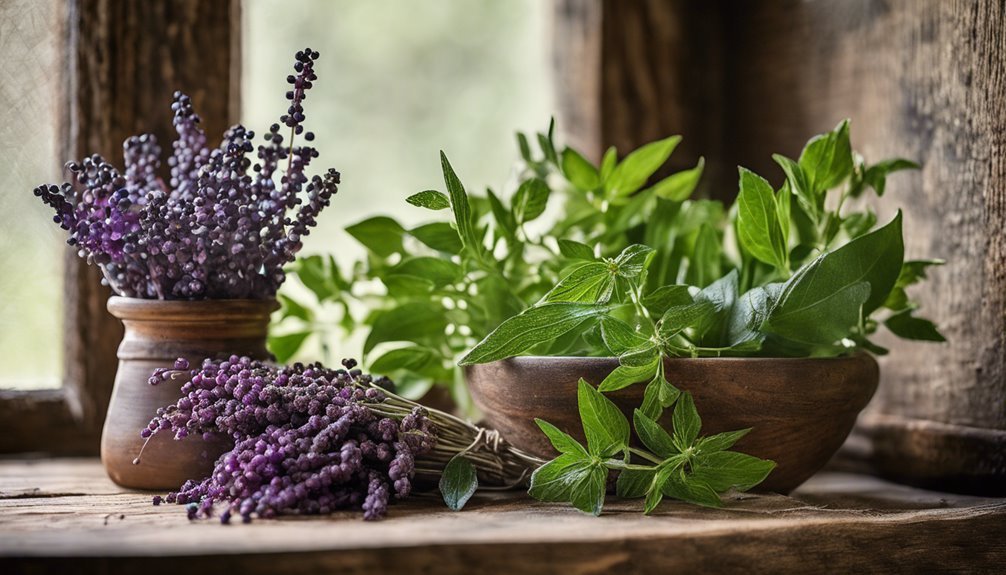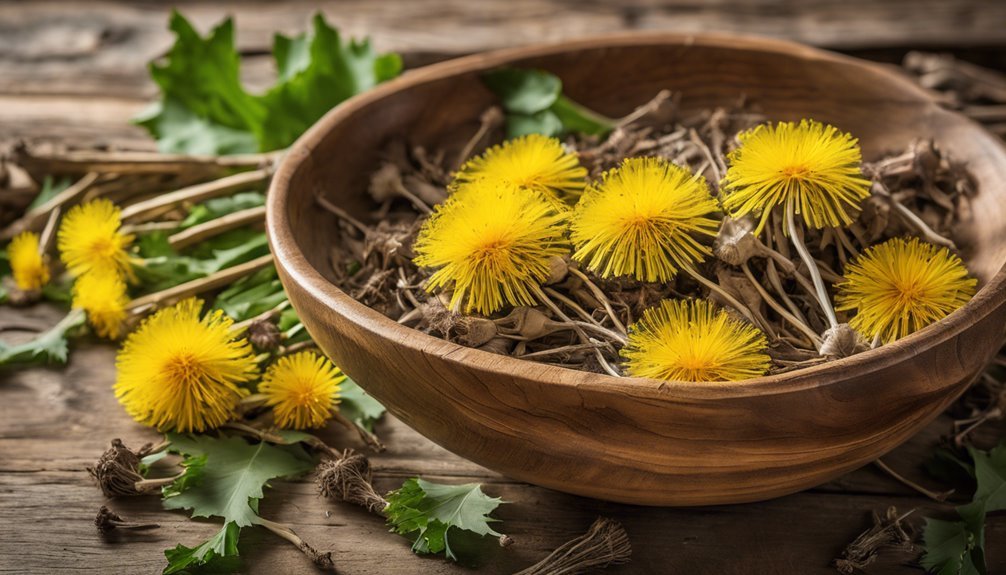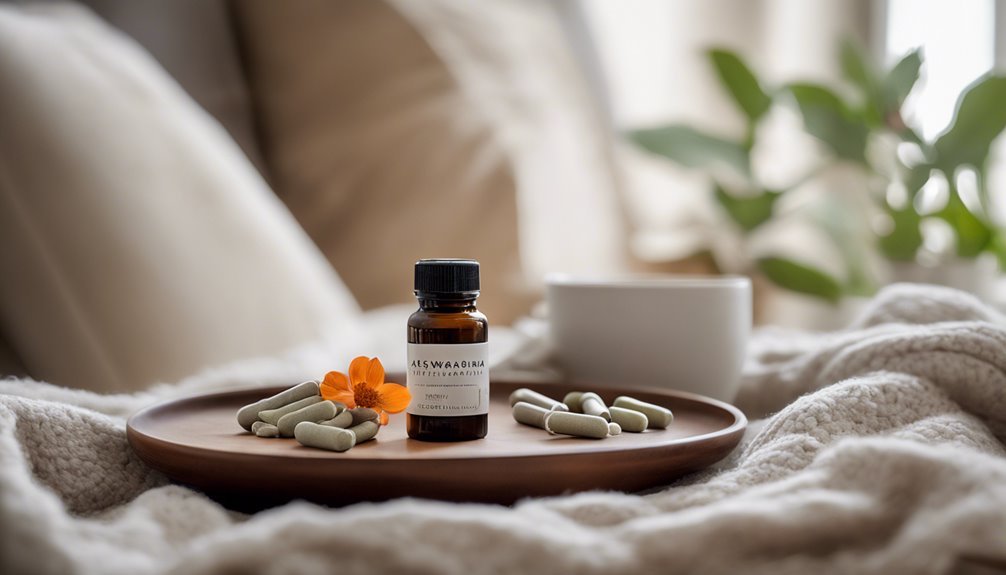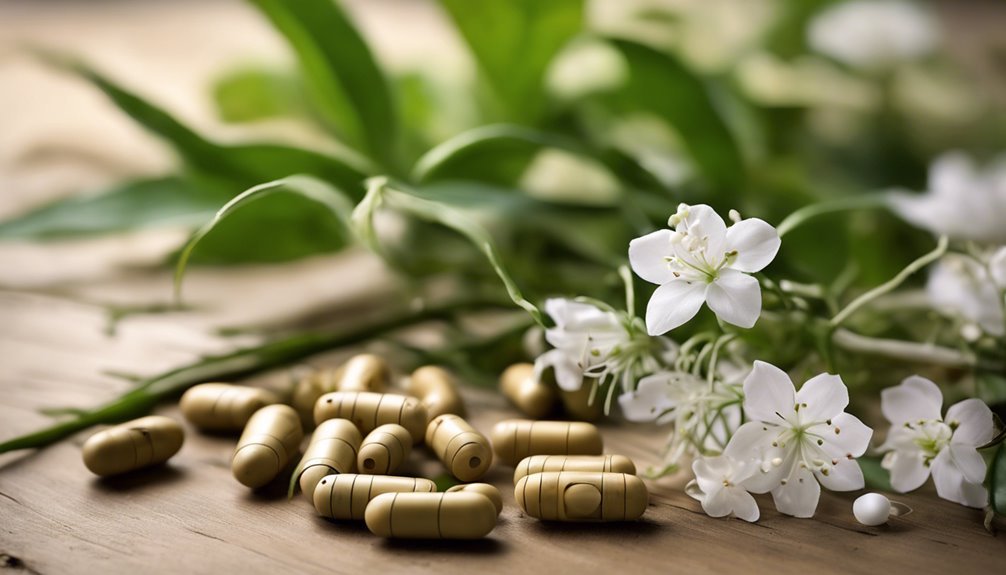Just as a garden requires nurturing to bloom, so does your body after childbirth. You're likely navigating the challenges of postpartum recovery, and herbal supplements might be a natural way to support your health during this time. Fenugreek, often recommended for milk production, and chasteberry, known for hormonal balance, are just the tip of the iceberg. Alongside these, herbs like shatavari and red raspberry leaf play pivotal roles in reproductive and uterine recovery. Yet, the question remains: how effective are these supplements, and what should you consider before integrating them into your wellness routine? What unfolds might surprise you.
Key Takeaways
- Fenugreek enhances milk production, supporting infant nutrition during the postpartum period.
- Chasteberry helps stabilize hormonal fluctuations and improves mood stability in new mothers.
- Ashwagandha reduces stress and anxiety by regulating cortisol levels, aiding postpartum recovery.
- Ginger aids in relieving digestive discomforts like nausea and bloating common after childbirth.
- Red Raspberry Leaf promotes uterine health and aids in recovery, enhancing overall post-delivery wellness.
Fenugreek for Milk Production
Fenugreek, a herb celebrated for its potent qualities, can significantly enhance milk production during the postpartum period. If you're struggling with your milk supply, incorporating fenugreek might be a wise choice. This herb has been traditionally used across various cultures for its natural ability to boost lactation.
It's not just about quantity; it's about supporting your body's natural processes during a time when you need it most. As you consider using fenugreek, remember that holistic health involves more than just taking a supplement. It includes understanding how each part of your body works together during the postpartum period.
Fenugreek can be a part of this balance, helping you nurture your newborn with confidence. When you take fenugreek, you're taking a step to empower your body's natural lactation process, thereby enhancing your capacity to care for your baby.
To integrate fenugreek into your diet, try it in tea, capsules, or even added to your meals. However, it's crucial to consult with a healthcare provider before starting any new supplement, especially during postpartum.
They can guide you based on your specific health needs and ensure that your lactation support is safe, effective, and aligned with your overall wellness goals.
St. John's Wort and Mood
St. John's Wort is a renowned herbal ally in your journey toward emotional wellness, especially during the postpartum period. This natural remedy is celebrated for its potential to aid in mood stabilization, helping you navigate the complex emotional landscape after childbirth.
You're not alone if you find yourself feeling a bit more down or anxious than usual. St. John's Wort works to gently balance your brain's neurotransmitters, which can contribute to a more stable mood.
As you care for your newborn, it's equally important to take care of your emotional health. Integrating St. John's Wort into your daily routine might provide the support you need. Typically available in capsules or teas, it offers a convenient way to enhance your well-being.
However, it's crucial to consult with a healthcare provider before starting any new supplement, especially if you're breastfeeding, as St. John's Wort can interact with other medications.
Red Raspberry Leaf Benefits

While managing mood with St. John's Wort, you may also consider incorporating red raspberry leaf tea into your postpartum routine. This herbal supplement is celebrated for its potential to enhance uterine health. Drinking this tea might support the uterus in regaining its normal tone post-delivery, which can be incredibly beneficial for new mothers like you who are seeking natural ways to recover.
Red raspberry leaf is rich in vitamins and minerals, contributing to its reputation as a tonic for women's health, especially during the postpartum period. Here's a concise overview to help you understand its potential benefits:
| Benefit | Description | Relevance to Postpartum |
|---|---|---|
| Uterine Support | May help the uterus contract and return to its normal size | Essential for recovery |
| Nutrient-Rich | High in magnesium, potassium, and iron | Supports overall health |
| Anti-inflammatory | Helps reduce inflammation | Comfort post-birth |
| Hormonal Regulation | Can assist in balancing postpartum hormones | Mood and health |
| Digestive Aid | Eases digestion, relieving constipation | Enhances comfort |
Ginger for Digestive Health
Often overlooked in the postpartum period, ginger can be a fantastic addition to your diet to help soothe digestive woes. Postpartum isn't just about adjusting to life with your new baby; it's also about caring for your body's recovery.
Ginger, a natural herb, can play a pivotal role in this phase. The benefits of ginger extend well beyond its familiar zingy taste.
Incorporating ginger into your daily routine can significantly ease digestive discomfort, which is common after childbirth. Whether it's nausea, bloating, or gas, ginger works effectively to alleviate these symptoms.
Here's how you can integrate ginger into your postpartum care:
- Ginger Tea: Start your morning with a warm cup of ginger tea. Not only does it help with morning sickness, but it also kickstarts digestion for the day.
- Add Fresh Ginger to Meals: Grate some fresh ginger over your dishes. It's a healthy way to enhance flavor while gaining digestive benefits.
- Ginger Supplements: If you find consuming fresh ginger challenging, consider ginger supplements. Ensure they're from a reputable source.
Chasteberry for Hormonal Balance

Transitioning to the topic of hormonal balance, chasteberry emerges as a supportive herbal ally in regulating hormonal fluctuations postpartum. You might find yourself struggling with the unpredictability of your menstrual cycle or the rollercoaster of emotions that can follow childbirth. Chasteberry, also known as Vitex, has been traditionally used to help stabilize these hormonal shifts and support a smoother transition during this delicate time.
Here's how Chasteberry can emotionally and physically support you:
| Emotional Impact | Physical Benefit |
|---|---|
| Enhances mood stability | Regulates menstrual cycles |
| Reduces anxiety | Alleviates breast tenderness |
| Promotes better sleep | Supports overall hormonal balance |
| Encourages emotional resilience | Minimizes postpartum hormonal fluctuations |
You're not just taking a supplement; you're nurturing your body's innate wisdom to rebalance itself after the profound experience of giving birth. Integrating chasteberry into your daily routine could be a gentle, effective way to care for your body as it adjusts back to its pre-pregnancy state. Remember, every step you take towards understanding and supporting your body's needs not only benefits you but also everyone you care for. Embrace chasteberry as a part of your journey towards holistic postpartum recovery.
Turmeric's Anti-Inflammatory Properties
Shifting focus to another powerful herb, turmeric is renowned for its potent anti-inflammatory properties, making it particularly beneficial during your postpartum recovery. This vibrant spice, commonly used in curries, contains curcumin, a compound that helps reduce inflammation and can aid significantly in healing and comfort.
Incorporating turmeric into your diet isn't just beneficial; it's also quite simple. Here are some ways you can use turmeric to harness its health benefits:
- Turmeric Tea: Steep turmeric root or powder in hot water and add honey for a soothing drink.
- Golden Milk: Mix turmeric powder with warm milk, a dash of pepper, and a bit of honey or maple syrup for a comforting beverage.
- Enhanced Meals: Sprinkle turmeric powder on vegetables or add it to soups for an extra flavor and health boost.
Concerning turmeric dosage, it's crucial to start with small amounts, such as a quarter to half a teaspoon per day, and observe how your body responds.
You can gradually increase the amount based on your comfort and health needs. Always consult with your healthcare provider before starting any new supplement regimen, especially to ensure it complements your postpartum care effectively.
Dandelion for Liver Support

Dandelion's natural compounds offer significant liver support, making it an excellent choice for postpartum women looking to enhance their recovery. The gentle detoxifying properties of dandelion help cleanse your liver, which is particularly beneficial after the increased load of pregnancy. This support is vital as your body works to eliminate waste and balance hormones.
Incorporating dandelion into your daily routine can be as simple as drinking dandelion tea. This herbal infusion isn't only soothing but packs a powerful punch in supporting liver function and aiding digestion. Dandelion tea increases the production of bile, which helps remove toxins effectively, ensuring that your liver isn't overwhelmed.
The dandelion benefits extend beyond mere detoxification. Its anti-inflammatory properties can also assist in reducing postpartum swelling and bloating, making you feel more comfortable as you recover.
Furthermore, dandelion is loaded with antioxidants, which protect your cells from oxidative stress, promoting overall health.
Nettle for Nutrient Replenishment
Supporting your body's recovery after childbirth, nettle stands out as a superb source of essential nutrients that are often depleted during pregnancy.
This wonder herb, particularly in the form of nettle tea, is packed with a high nutrient density that can significantly aid in your postpartum healing process.
Nettle is known for its rich content of vitamins and minerals, including iron, which is crucial for restoring your energy levels and overall vitality.
Sipping on nettle tea can be a comforting and effective way to replenish these vital substances. Its natural properties support the replenishment of your body's needs, helping you to feel more revitalized and capable of caring for your newborn.
To effectively incorporate nettle into your postpartum care, consider these tips:
- Brew nettle tea daily: A warm cup can provide a gentle and natural nutrient boost.
- Incorporate dried nettle into soups: This can enhance the flavor and nutritional profile of your meals.
- Consult with a healthcare provider: Especially to tailor nettle use to your specific nutritional requirements and health condition.
Embrace nettle for its natural bounty and support your journey to full recovery with its wholesome goodness.
Ashwagandha and Stress Relief

As you navigate through the challenges of postpartum recovery, Ashwagandha serves as a natural ally in managing stress and enhancing resilience. This ancient herb, renowned for its adaptogenic properties, can help you cope with the physical and emotional demands that come with motherhood. Ashwagandha's benefits extend beyond mere stress management; it's a holistic aid that supports your overall well-being during this critical time.
Incorporating Ashwagandha into your daily routine could be a game-changer. It's not just about reducing stress; it's about empowering you to feel more balanced and in control. Here's a quick look at how Ashwagandha can be integrated into your postpartum health plan:
| Benefit | Description |
|---|---|
| Stress Reduction | Helps regulate cortisol levels, reducing the feelings of stress and anxiety. |
| Energy Boost | Enhances energy and reduces fatigue, aiding in the recovery from childbirth. |
| Mood Improvement | Supports emotional balance and helps improve mood swings associated with postpartum changes. |
Motherwort for Heart Health
Motherwort, often heralded as a heart tonic, can be a vital part of your postpartum health regimen. As you navigate the challenges of motherhood, it's crucial to care for your heart, and motherwort can help you do just that. This herb has been used traditionally to improve cardiovascular function and alleviate stress.
Incorporating motherwort into your daily routine can significantly benefit your heart health. Typically, a motherwort tincture is used for ease of absorption and convenience. You'll want to start with a low motherwort dosage and consult your healthcare provider to find the optimal amount for your specific needs.
Here are some tips to effectively use motherwort:
- Start Small: Begin with a small dosage of motherwort tincture to see how your body reacts.
- Consult Professionals: Always discuss with a healthcare provider before starting any new supplement.
- Monitor Changes: Keep an eye on how your heart feels during use; motherwort should help in soothing and strengthening your heart.
Shatavari for Reproductive Recovery

Shatavari, renowned as a reproductive rejuvenator, plays a crucial role in your postpartum recovery. This powerful herb supports your body as it regains strength and balance after childbirth. Shatavari benefits are vast, especially for new mothers looking to restore their reproductive health. It's known for enhancing lactation, normalizing hormonal levels, and improving uterine health, which are crucial during the postpartum period.
When considering shatavari dosage, it's important to consult with a healthcare provider to tailor it to your specific needs. Typically, the recommended dosage ranges from 500 mg to 2000 mg per day, depending on the form and concentration of the supplement.
Here's a quick guide to understanding the key benefits of shatavari:
| Aspect | Benefit | Consideration |
|---|---|---|
| Hormonal Balance | Regulates estrogen levels | Essential post-birth |
| Lactation | Promotes healthy milk production | Supports infant nutrition |
| Uterine Health | Tones and nourishes the uterus | Aids in recovery |
Embracing shatavari could significantly enhance your postpartum experience. By integrating this supplement into your daily routine, you're not just aiding your own recovery; you're ensuring you're at your best for your new little one. Remember to approach this phase with patience and care, as every mother's journey is unique.
Peppermint to Ease Nausea
While Shatavari supports your reproductive health, peppermint offers a gentle remedy for postpartum nausea. You're not alone if you're experiencing queasiness after welcoming your baby.
Peppermint, known for its refreshing scent and soothing properties, can be a natural solution to help you feel better. Peppermint works by relaxing the stomach muscles and improving bile flow, which helps you digest more comfortably.
Drinking a warm cup of peppermint tea can provide immediate relief. The aroma alone from peppermint oil can also be deeply comforting. If you're feeling nauseous, try inhaling a little peppermint oil or sipping some tea.
Here's how you can incorporate peppermint into your routine to help manage postpartum nausea:
- Peppermint Tea: Brew it fresh and sip slowly. The warmth and the menthol can soothe your stomach.
- Peppermint Oil: Add a couple of drops to a diffuser or inhale directly from the bottle when nausea strikes.
- Diet Integration: Include peppermint in your meals, whether it's adding fresh leaves to a salad or a minty dressing.
Frequently Asked Questions
Can Herbal Supplements Affect Breastfeeding Negatively?
Yes, some herbal supplements can negatively affect breastfeeding.
It's crucial to prioritize herbal safety and understand the potential breastfeeding effects before incorporating any into your routine.
Always consult a healthcare provider to ensure the herbs you're considering are safe and supportive of your breastfeeding journey.
This informed, holistic approach helps protect both your health and your baby's, demonstrating your commitment to caring for yourself and your little one effectively and safely.
When Is the Best Time to Start Postpartum Herbal Supplements?
Imagine blossoming anew as you navigate your journey after childbirth.
The best time to start postpartum herbal supplements is typically after you've consulted with your healthcare provider. They'll help align postpartum timing and supplement benefits with your unique recovery needs.
This approach ensures you're supported holistically, nurturing your body safely and effectively.
It's not just about healing; it's about thriving for you and, by extension, for those you care deeply about.
Are There Any Allergenic Herbs to Avoid Postpartum?
You should be cautious about certain herbs postpartum, especially if you're prone to allergies.
It's crucial to consult your healthcare provider to ensure herbal safety and avoid any that might trigger allergic reactions.
Remember, what's beneficial for one mightn't suit another.
Your careful selection supports not just your health but also your ability to care for your newborn effectively.
Always prioritize safety and tailor your choices to your specific health needs.
How to Choose Safe Herbal Supplements for Postpartum?
When choosing safe herbal supplements for postpartum, it's vital to follow established herbal safety and postpartum guidelines.
Start by consulting a healthcare professional who understands holistic approaches. They'll ensure the supplements you're considering are appropriate for your specific health needs, helping to prevent any adverse reactions.
Can I Use Herbal Supplements With Other Medications?
You should be cautious about mixing herbal supplements with other medications due to potential interaction concerns.
Always consult your healthcare provider to discuss the specific supplements and medications you're considering. They can offer guidance on safe usage and advise you on proper dosage guidelines.
Conclusion
As you navigate the tender postpartum journey, think of these herbal supplements as tools in your wellness toolkit, each one a beacon guiding you back to health. From the soothing waves of peppermint easing nausea to the sturdy anchor of red raspberry leaf fortifying your uterus, they're here to support you holistically. Always consult your healthcare provider to tailor this herbal bouquet to your unique needs, ensuring a safe and harmonious recovery.




